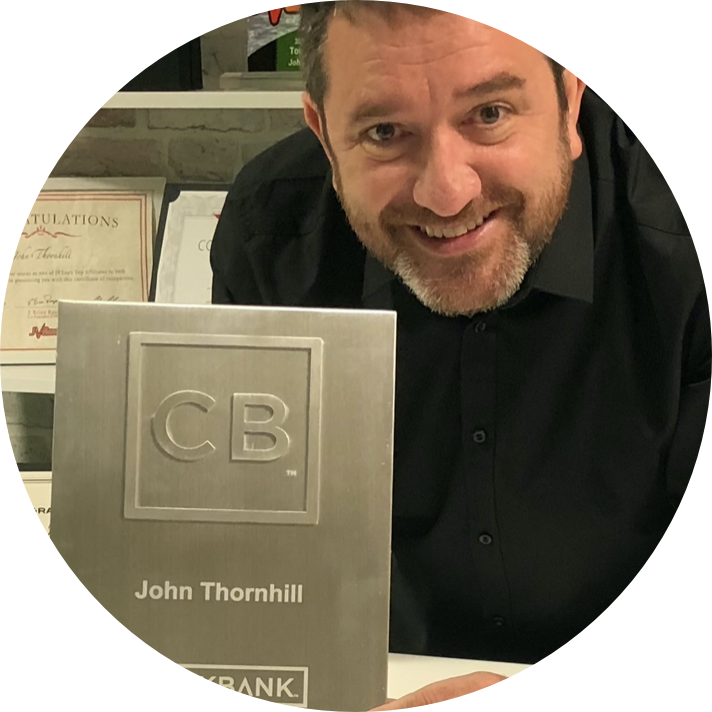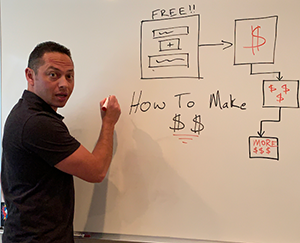Crafting Your Leadership Story: Lessons Around the Campfire written by John Jantsch read more at Duct Tape Marketing
The Duct Tape Marketing Podcast with John Jantsch In this episode of the Duct Tape Marketing Podcast, I interviewed Tony Martignetti, a leadership advisor, coach, bestselling author, podcast host, and speaker. With over 25 years of business and leadership experience, Tony brings a wealth of knowledge to the table. Our conversation dives into the intricacies […]
Crafting Your Leadership Story: Lessons Around the Campfire written by John Jantsch read more at Duct Tape Marketing
The Duct Tape Marketing Podcast with John Jantsch
In this episode of the Duct Tape Marketing Podcast, I interviewed Tony Martignetti, a leadership advisor, coach, bestselling author, podcast host, and speaker. With over 25 years of business and leadership experience, Tony brings a wealth of knowledge to the table. Our conversation dives into the intricacies of crafting a compelling leadership story, drawing inspiration from the metaphor of traditional campfire stories.
Key Takeaways
Key Takeaways: Embark on a transformative journey with Tony Martignetti as he emphasizes the power of storytelling in crafting compelling leadership narratives. By overcoming self-limiting beliefs, fostering a culture of continuous learning, and embracing remote work dynamics, leaders can navigate challenges, drive innovation, and build resilient organizations. Tony’s insights empower leaders to unlock their true potential, unite teams, and thrive in today’s ever-evolving business landscape.
Questions I ask Tony Martignetti:
[01:27] Why the metaphor ‘campfire stories’ ?
[02:22] Explain the concept of Intentionally creating your own world
[03:35] Would you say storytelling has become an essential leadership skill today?
[04:46] Would you agree that the power of stories helps achieve understanding in an authentic way?
[06:18] Would you say building trust is a key element in telling stories?
[07:17] What is disruptive thinking and what are some examples of how to apply them in business?
[10:38] How do businesses overcome self-imposed limitations to leadership?
[12:27] What habit or practice do you believe would help businesses build confidence in achieving their set goals?
[14:20] How can businesses foster a mindset and culture around learning and teaching new things?
[14:20] What is a great medium to cultivate and share campfire stories?
[16:24] Where can people connect with you and grab a copy of your book?
More About Tony Martignetti:
- Connect with Tony on LinkedIn
- Check out Inspired Purpose Partners
- Grab a copy of Campfire Lessons For Leaders: How Uncovering our Past Can Propel Us Forward
Like this show? Click on over and give us a review on iTunes, please!
Connect with John Jantsch on LinkedIn
John (00:08): Hello and welcome to another episode, the Duct Tape Marketing Podcast. This is John Jantsch. My guest today is Tony Martignetti He’s a leadership advisor, coach, bestselling author, podcast host, and speaker. He brings together over 25 years of business and leadership experience an extreme curiosity to elevate leaders and equip them with the tools to navigate through, change and unlock their true potential. We’re going to talk about his latest book, campfire Lessons for Leaders, how Uncovering Our Past Can Propel Us Forward. So Tony, welcome to the show.
Tony (00:43): Well, thank you so much. I’m thrilled to be here.
John (00:45): So I see your very Italian last name. You told me you’re from Boston, so I’m envisioning some of the South sider kind of accent coming out of you. Have I been watching too many movies?
Tony (01:01): Too many movies. I actually grew up in the suburbs, so I don’t have that real Boston accent, but I’ll do my best if you’d like that.
John (01:12): Okay, yeah, yeah. It’s the Matt Damon line. Let’s go up to Hava and beat up some smart guys or something. That’s what I was envisioning. I
Tony (01:19): Like them apples. I like them apples.
John (01:22): Alright, so right off the bat, I mean I want to get into part of the title. You use the concept of being drawn into the campfire. Just help me understand a little bit of why that metaphor.
Tony (01:34): Yeah, I mean, campfire has first of all been something that for me has meant a lot throughout my entire life. I’ve always been someone who loves being outdoors and around campfires. But let’s be honest, there’s campfires have been this place where the most powerful stories get told, and it’s been since the beginning of human history, since we found fire, we’ve decided to gather around it. And it’s not just for the superficial stories, it’s more for the deep, more transformational conversations that happen there.
John (02:11): We would go camping. My dad would always tell scary stories. I just married scare the heck out of us around the campfire. It was kind of fun for that too, but it was also a great bonding, right, A bonding moment too. So early on in the book you talk about this idea of creating your own world, in fact intentionally creating one’s world. So help us understand that idea.
Tony (02:34): Yeah. Sometimes we have this expectation that the way things are the, that the environments are put into are what we have to accept. Reality is that that’s not true. That we have more agency over crafting our environment and also creating things that didn’t exist before. So I think that’s an important way to think about how to navigate your own life and create your own story about what you want to have. So I think one of the things that I often connect with, and you’ll hear from some of the stories in the book, if you pick it up, there’s this idea that if something doesn’t exist, you may have to go internally and say, well, maybe I’m the one to create it.
John (03:27): Yeah, yeah. So I think you’ve mentioned storytelling a number of times. Obviously the campfire brings up that idea of storytelling. Has that become an essential leadership skill in your mind?
Tony (03:40): Yeah, I think that we, and sometimes people, they get it on the surface of this idea of like, okay, yeah, we need to be able to tell stories in order to pitch to investors and such and such and such. But then they lose the idea that storytelling has to be ingrained in everything we do. What’s the story we’re telling our employees? What are these stories that our employees are telling each other and how are we ensuring that they’re all coming from a place of wanting to ensure that we’re all connected around what’s real? What is the drive us to a better connection? So storytelling when done, can get people aligned and also motivate people to move in the right direction.
John (04:33): I mean, I know we’ve all experienced this, right? You go and you hear somebody maybe a speaker at an event and they’re trying to communicate an idea or a concept and they always, because it’s kind of speaker training, go into some sort of story to help illustrate the point. And I think a lot of that’s just a realization that people learn better that way. I mean, is that really part of the power of storytelling is that you can get a lot more across in a much more authentic way?
Tony (05:03): Yeah, I mean it is, but I think I want to start with something a little bit more internal first, which is that the story helps to solidify for us the speaker and the person who’s sharing the concept, and we get it inside of us when we realize that the story we’re sharing helps us to understand the concept better. And so we’re able to connect with the idea on a deeper level and therefore we’re able to communicate it more effectively. So it starts with the person who’s sharing the idea, and then that helps to bridge the divide, if you will, between that person who’s sharing it and the person who’s receiving it. Whether or not it’s the same message that is not in our control, but what is in our control is that we feel the message and the message is then being portrayed and connected to somebody else.
John (06:04): And I think there’s also a level of trust building that goes on is in there in storytelling. I mean, I know when I’ve gone to a website and you see, first thing you see is a video and it’s the founder talking about what problem they were trying to solve or why they do what they do. And there’s kind of this immediate trust that to me goes far beyond a great marketing message trying to sell me something. I mean, is that probably an element as well?
Tony (06:30): Yeah, I mean, I’m glad you went to trust. I think there’s an element of that which is so important, is to trust that this person’s intentions are coming from the right place. And I came from an industry where I was working in biotech for a number of years, and so oftentimes you want to know, is this person doing it just for the money or they doing it because there’s someone standing behind them or a patient that they have in mind that this is driving them forward and saying, I’m doing this for my mother, I’m doing this for my child. And that is what at the center, and not just in their mind, but in their heart is what’s driving them to do what they do.
John (07:15): One of the chapters is actually titled Your thinking. So do you have some examples? I know you have examples in the book and in your own podcast this where you’ve gathered some of these examples of what disruptive thinking looks like and how we should maybe even approach that idea. It sounds sort of radical to some people, but you’re not putting it out there as a radical idea as much as a practical idea.
Tony (07:41): Yeah, and oftentimes we think of disruption as being this, oh gosh, we have to be the disruptive child in the background in the class, or it has to be this groundbreaking thing, but disruption can be a small act that then changes everything slowly over time. So I think we have to think of it that way too because when I think about personal disruption, it’s looking at things from saying, I’ve always been doing X and I’ve always been seeing these results come through this. What I need to do is maybe stop what I’m doing and really reframe the whole trajectory of what I’m doing and think about how could I pivot and move in different direction using what I’ve already known. It’s completely changing the game. I think of Whitney Johnson as the person who comes to mind almost immediately because she wrote the book about disrupting yourself, and I think she disrupted her own self by taking herself out of Wall Street and doing investment banking and then deciding to go off and become an author and a person who helps to shape the world of personal development and growth. It’s kind of an interesting concept
John (09:00): In marketing circles, a lot of times a disruption’s just looking at your industry and saying, well, everybody’s website that is in this industry looks just like this. How could we zig and look different? So it doesn’t have to always, as you said, be so disruptive. It can just be how can we be different?
Tony (09:18): Exactly. Exactly. Yeah. Think of your small active of disruption and use that as just a starting point, right? Because I know a lot of people get scared about putting up to and for skin to a new move.
John (09:32): Well, and there are some disruptions. I mean, example I like to cite all the time is newspapers got killed by Craigslist because they weren’t willing to disrupt their model. So instead of figuring out a way to change it in a way that would keep them still relevant, I suppose in the classified ads world, they basically just hung onto it and then lost everything.
Tony (09:56): Yeah, and I think that’s a perfect example, this idea of if you’re holding onto tightly to a story that you’re telling yourself or to a thing that you think is part of who you are, and maybe it’s time to let go of that and start to move in a different direction because that other direction could be what propels you forward.
John (10:22): So I work with a lot of entrepreneurs, some that are starting, some that have been around business a long time, and there are a lot of what stops them from trying something new from growing, even things they know, they know this is what I should do, is that there’s some self-limiting beliefs, and I know you write about that quite a bit. I mean, what are some ways that people might overcome some of the self-imposed limitations that they have that are stopping them?
Tony (10:51): Yeah, I mean one of the best ways to start that is to really look back and look at some of the ways that they’ve done things that are incredible in the past. We sometimes lose sight of the brilliant things we’ve accomplished, I think sometimes of this concept called the gap in the game, which is if you’re always focusing on what you haven’t done yet or how much further you have to go your gap, there’s a challenge that you’re always feeling less than you’re always feeling like, I can’t do that or look how much further I have to go. But if you think about all the things you’ve accomplished and you think about how you overcame that, more than likely you overcame limiting belief by taking action. And so I think the key thing is to stop and look back and see where have I done things that I didn’t know how to do before and what did I have to disbelief unlearn to then move forward in the uncertainty of that?
John (11:55): A great other book that you just referenced there, the Gap in the Gain by Dan Sullivan and Ben Hardy really goes very deep into that specific practice. Chapter nine or chapter eight, take the Courageous Leap. For a lot of people, maybe these things kind of intersect each other, but I mean that’s really easy to say. That’s a really easy one. Leap in the net will appear. You hear all the things like that, right? What’s going to practice or what habit is going to get somebody to the point where they say, yeah, I can do that. Do they have to have their back against the wall? Do they have to failed so badly that they’re like, what if I have to let to lose? I mean, what motivates somebody to do that thing that is so scary or at least scary sounding?
Tony (12:45): Yeah, I mean, one of the starting points I always think about is to really look at the risks first and get informed. The framework I use throughout the book is this idea of the three Cs, which is curiosity, connection, and compassion. And I think if you use those three Cs as a way to look at the landscape before you take the leap, you’re trying to understand, well, what’s the worst that could happen? If I take this leap, what are the potential risks that I’m going to be jumping into? Is this something I can come back to, come back from? Sorry, those are the things you’re looking for. And also know that if you do leap out, what can I do to make sure that I’m supporting myself along the way, or if I make a mistake, am I going to beat myself up about it? No, I mean, I got to be okay with making mistakes. I just had a conversation about startups and how many failures there are out there. People only think about the ones that have naked, but there’s billions upon billions of startups that don’t make it. And luckily,
John (13:55): You’re right. We never do it.
Tony (13:57): So I think that’s part of
John (13:58): It. So I’ve always felt, whether I call myself a continuous learner, I think I just like it. I’m curious. I love learning new things. That’s actually what I’ve done this career for 30 years, and a lot has changed. Technology has changed, and I think what’s allowed me to stay in the game, frankly, is that I enjoy learning the new things and teaching the new things. But how, in your mind, how can leaders foster that mindset, not just themselves, but really with all their teams, with their entire company? Because I think it becomes a culture asset to have a group of folks that think that way.
Tony (14:33): Yeah. I think the starting point of being in that place of the continuous learning is to really understand what is it that I’ve come to believe is true, and where do I want to challenge my understanding? Because sometimes the best learning comes from this place of where have I become settled and not really challenging? Maybe those are the areas where I really need to push the envelope or question again. And so I think pushing on those elements are important, and you can do that best in a collective nature. When you’re with other people and you’re like, Hey, I’ve always thought that this is the truth. What do you think? Who has another idea? Who has another perspective? And this comes to something that I mentioned at the very end of the book. When I originally started this, the concept of my podcast called The Virtual Campfire, which led to the book, I had this idea of bringing together what’s called Divergent Minds and then Convergent Hearts, different thinkers coming together and sharing ideas so that people could challenge themselves to see different perspectives. Not that we have to agree, but it’s about thinking different. But converging hearts is about respecting each other and leaving connected by this way of like, Hey, if we get together, maybe at least we can honor.
(16:01): That was the idea.
John (16:02): Need a good facilitator? Good facilitator for that. Right?
Tony (16:05): Absolutely.
John (16:06): Keep the knee jerk reactions in it.
Tony (16:08): No doubt. I think that’s why it’s important. You have to have a safe space. You have to make sure that it’s a community that is willing to be okay with that. You can’t be breaking into fist fights and such.
John (16:20): So increasingly today, myself included, my entire team is distributed. Our campfire metaphor is slack. Does that bring some different dynamics? It certainly brings different dynamics, I guess I should say. Does that require some different practices to make this work?
Tony (16:39): It does, but I want to also say even though it’s always better in person, let’s be honest, there’s something about being in person with people that brings a new dimension. Dimension. That’s right. But I think you can do a lot through Slack and you can do a lot through virtual communication, but it’s all about how you approach it, and it’s all about setting the stage. And so the key thing is to make sure that you are not just weaving it back into all the other business and saying, okay, now we’ve done that. Let’s all sit around and talk. But you have to create a moment for that. Maybe it’s about connecting through a special event. You just say, Hey, let’s have a campfire conversation, and that’s where we’re going to sit down and talk about what’s new, what’s going on with you, and what are the things that you haven’t talked about in a while, but you think would be great to share.
John (17:38): Yeah, we have discovered it takes intention. Of course, it takes consistency. We have a couple channels that are set up specifically for sharing things outside of work specifically for, we pose a question every week that has nothing to do with work and everybody answers and things like that really do kind of allow people to feel like they can. It’s not all business all the time. For sure.
Tony (18:07): Yeah.
John (18:08): Yeah. Tony, I appreciate you stopping by the Duct Tape Marketing Podcast. You want to invite people where they might connect with you, learn about your work, and certainly learn about how they can pick up a copy of Campfire Lessons for Leaders.
Tony (18:22): Fantastic. Well, first of all, I want to thank you. This has been really a great conversation. I love your questions, and the best place for people to find me is my [email protected]. That’s I with a letter I, not BI. And you can find me there, and if you go there, you’ll find out all types of great things. I have an assessment, so I have all types of cool stuff to check out. And then the other places is on LinkedIn. I’m really active there, so you can find me under my name Tony Martini with a one at the end instead of an I got to make things difficult, I guess. And then the last place, Amazon’s a great place to find my books. You can find my new book, campfire Lessons, and also my previous book, which is called Climbing the Right Mountain.
John (19:08): Awesome. Great. Again, appreciate you taking a moment to stop by, and hopefully we’ll run into you on these days out there on the road.
Sign up to receive email updates
Enter your name and email address below and I’ll send you periodic updates about the podcast.
Recommended Story For You :

How To Make $3493 Commissions Without Doing Any Selling

Successful dropshippers have reliable suppliers.

People Think I Use A Professional Voiceover Artist. NO! I Just Use Speechelo!

Make Money Testing Apps On Your Phone Or Tablet

Make More Money or Lose Everything

Sqribble Is The ONLY eBook Creator You’ll Ever Need.

Work & Earn as an Online Assistant

Create Ongoing Income Streams Of $500 To $1000 Or More Per Day

It's The Internet's Easiest Side Business.


